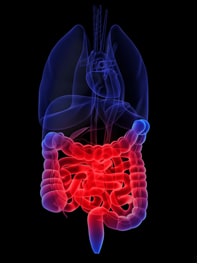The Painful Consequences of Faulty Digestion.
 Seemingly unrelated symptoms—abdominal pain, acne, allergies, anemia, arthritis, anxiety, colitis, constipation, cramps, diarrhea, fatigue, hives, irritable bowel, skin rashes, trouble concentrating, vaginal infections, and unexplained weight change—can all result from the same problem, leaky gut.
Seemingly unrelated symptoms—abdominal pain, acne, allergies, anemia, arthritis, anxiety, colitis, constipation, cramps, diarrhea, fatigue, hives, irritable bowel, skin rashes, trouble concentrating, vaginal infections, and unexplained weight change—can all result from the same problem, leaky gut.
Normally, the lining of the intestines absorbs only well-digested nutrients. But if the intestinal lining becomes irritated, its tight junctions (that normally seal off the digestive tract from unwanted substances) loosen to allow undigested food, bacteria, and toxins to reach the bloodstream.
The immune system sees these unwanted substances as foreign invaders and triggers antibodies to fight them. This, in turn, produces inflammation throughout the body—leading to those seemingly unrelated symptoms.
Unfortunately, the causes of leaky gut are as numerous and varied as its symptoms. Long-term use of drugs like antibiotics, harsh laxatives, and NSAIDs (aspirin, ibuprofen like Advil, and other non-steroidal anti-inflammatories) can injure the intestinal lining, as does chemotherapy and radiation.
Aging, alcohol, caffeine, dysbiosis (imbalance of good and bad bacteria in the GI tract), food allergies (particularly gluten and lactose intolerance), lack of fiber in the diet, parasites, and yeast overgrowth are other all-too frequent causes.
Dr. Ann Louise’s Take:
It’s important to rule other serious problems like Crohn’s disease or colon cancer. But conventional medicine has been slow to recognize leaky gut even when its symptoms are all too real.
Make meals a time to relax, chewing your food slowly and thoroughly. New research shows that glutamine, N-acetyl cysteine, and zinc help reduce inflammation and normalize leaky gut.
I consider L-glutamine an unsung hero—found in the brain, liver, lungs, and muscles, in addition to large amounts in the lining of the digestive tract. This amino acid prevents the villi (the tiny, fingerlike part of the small intestine that allows nutrients in) from becoming too porous, allowing substances normally too large to breach the intestinal wall to enter the bloodstream and causing allergic reactions and other problems.
Besides helping to create a barrier against pathogens, L-glutamine encourages the growth of probiotics, which also defend the gut from unwanted invaders. Researchers who gave glutamine to people with ulcerative colitis have found that this amino acid not only reduced intestinal inflammation but also increased good bacteria.
As an added bonus, L-glutamine feeds immune cells in the gut, making it important for anyone who’s on chemotherapy or radiation. When scientists in Poland treated malnourished patients with damaged intestinal tracts this versatile amino acid, many of the lymphocytes (important immune cells) revived, while patients’ absorption of nutrients improved.
I recommend taking 500 to 1,000 mg of L-glutamine. It works best one or two hours before or after meals, as stomach acid weakens its activity.
Sources
https://www.ncbi.nlm.nih.gov/pubmed/19127706
https://www.ncbi.nlm.nih.gov/pubmed/19112401









17 Responses
Hello there – I have read that plant enzymes are also excellent for leaky gut – that they aid in breakdown of food in any PH therefore working on all phases of digestion – should one take both L-glutamine and enzymes?
thanks!!
I have what I call swelling in my belly often times between meals or right after eating. This symptom happens at various times. meaning not every time I eat or any specific foods. I have had Ultra sound done my abdomen and all looks good. I had a sigmoid resection 12 years ago. It was due to diverticular disease. I am 56 and other wise very healthy. normal weight, good eating habits, exercise and really take good care of my body. I am currently taking acidophilus and probiotics to try and improve the quality of my life because the belly swelling keeps me really uncomfortable and it feels better wearing big loose clothing. This condition has me extremely interested in whatever info available. I am currently reading the Psoriasis healing the natural way. Any comments or advise?
I have Ulcerative Colitis and Primary Sclerosing Cholangitis.I would really appreciate any advice
L-glutamine it is then. Sounds like I need this. However, my question is, how long will I need to be on this amino acid? Even though alot of the herbs, amino acids, vitamins that you recommend are natural, I am taking SO many pills (all natural and recommended by you), that I feel like a natural pharmacy! Help!
Are there good natural sources (food) of L-glutamine?
Thanks!
Dear Friends:
I would love to answer each and every single one of your queries, as I have done to the best of my ability, in the past. The popularity of this Blog has grown to the extent that I can no longer provide that service but what I can tell you is that we are making plans for an Internet TV show. I will then be able to take ALL of your questions and answer them to the best of my ability. Stay tuned! And so, in the interim, may I suggest that if you have questions about products, call UNI KEY at 1-800-888-4353. The folks there are helpful and will direct you accordingly. If you are concerned about a particular health condition, then by all means check out the Testing Kits on my site which will help you to determine underlying causes. Please don’t let this dissuade you from posting. Thank you so much for your enthusiasm and interest!
Hi,
My daughter (8 years old) is a confirmed celiac. Can she take L-Glutamine to help her absorb nutrients better? I Love Fat Flush Plan/Cookbook, etc…. Whenever I drink the longlife cocktail and warm lemon water I feel great. That is a true remedy for bloat, constipation, etc… I swear by it!!! Thanks.
My son has Crohn’s Disease, an Auto-Immune Disease of his intestines. I have Hashimoto’s Thyroiditis and Hypothyroidism. I tested for food allergies, and I’m allergic to EVERY FOOD except, Banannas, Red Meat, and Pecans. Yea, like I’m going to live on a diet of that! What would you recommend for these symptoms? Thanks.
Does a raw food diet help to control or alleviate leaky gut? Am doing that right now and do notice a lot of changes going on.
I had perferated Diverticulitis a year ago, tokk injections of antibiotics, colonoscopy, and still have bloating all the time. Would l-gluatamine help???
I am not a dr. but nanettes response on 11/9 really worries me when I hear this from a woman. She should rule out ovarian cancer with at least a ca125. Her symptoms sound like the list of cautionary signs given by the American Cancer Society.
Most autoimmune, like Crohn’s is a result of leaky gut, not vice versa. There was a study that was just released that proved that leaky gut was the cause of ibd. This should help pick up the momentum for conventional medicine to catch up with the alternative community on this one.
I forgot to mention… Supplements like L-Glutamine are great for healing the gut lining but they will only work if you create a healing environment. If you don’t remove the sources of intestinal inflammation, then using supplements is like trying to put out a forest fire with a garden hose. It won’t do much good.
A buddy recommended me to check out this website, great post, fanstatic read… keep up the nice work!
Good article! I have used L Glutamine for many years with favorable results…especially the sustained release types. I have also seen benefits from regular use of 100% pure psyllium husks.
why can you not take an enzyme with protease
if you have pancreatitis
I have not heard this. Where did you hear this was true?